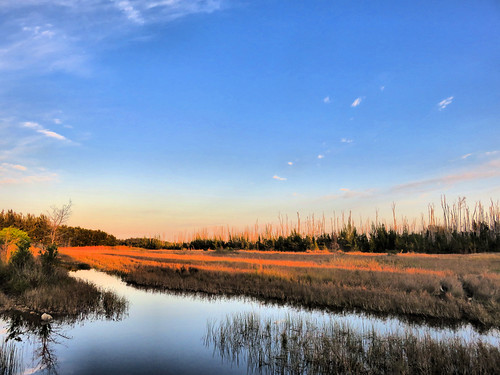
This photo has the rich warm colors of autumn, yet it was taken on the first day of spring. I was walking along a primitive farm road which runs due west, so the sun rose behind me and cast my shadow on the path ahead:
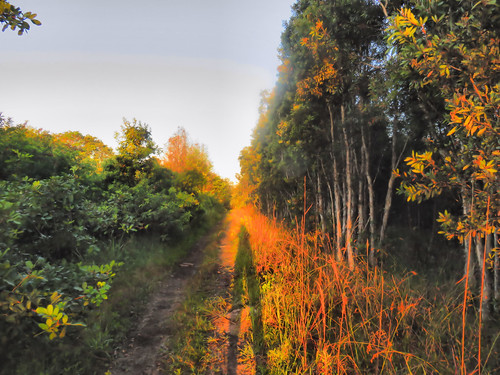
All generalizations are false, including this one-- "All white herons are egrets." True, here in south Florida the most common white heron in our local birding patch is the Great Egret, so graceful in flight:
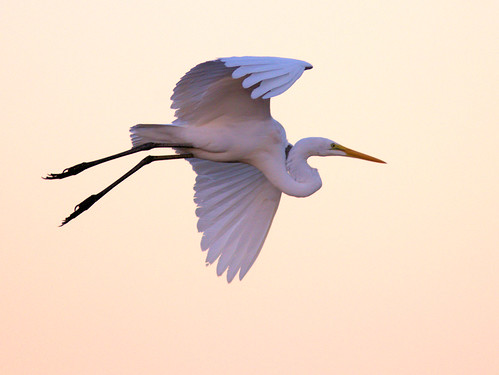
Egrets possess decorative fluffy plumes (aigrettes). Plumes, similar to the down which underlies the body feathers, lack the barbicels which link the fine branches of body and flight feathers together to form stiff vanes (Reference below).* This distinguishes egrets from others in the heron family, as demonstrated by this Great Egret:
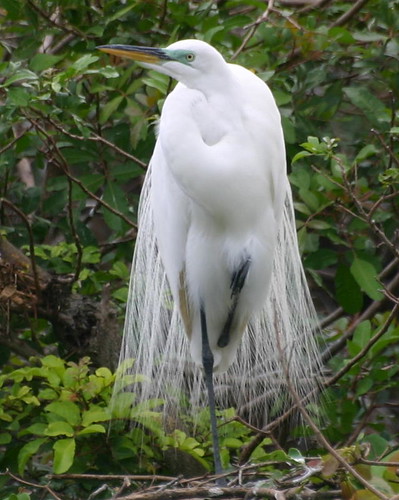
The Snowy Egret was hunted nearly to extinction for its plumes:
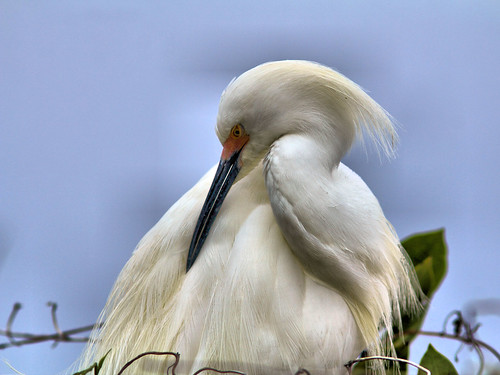
While the Great Egret has a long yellow bill and black legs, the much smaller Snowy Egret has a thin dark bill and bright yellow feet
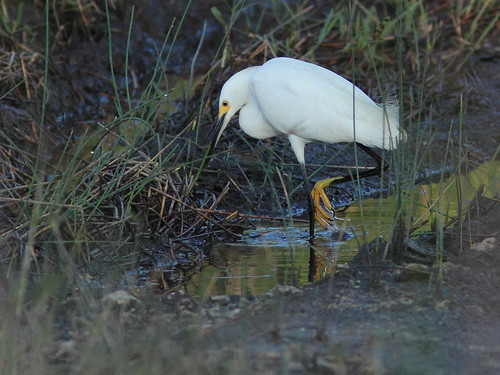
The small Cattle Egret is usually found away from water, has a short yellow bill and dark legs:
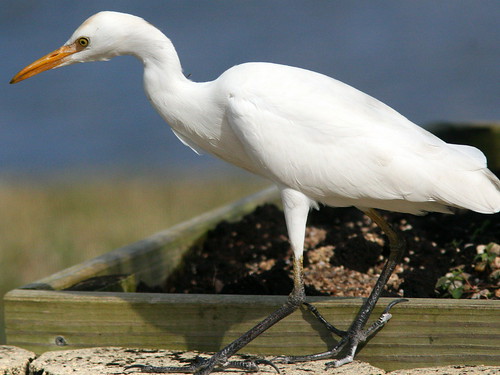
Pregnant cow with Cattle Egrets:
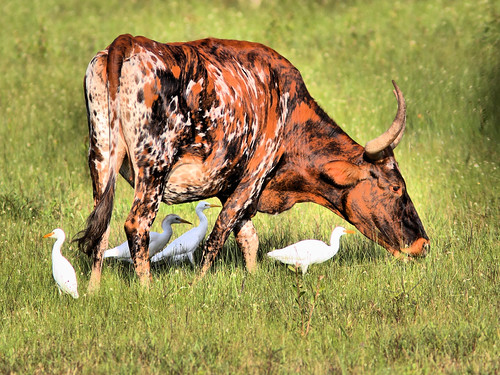
Cattle Egrets may perch on the backs of cattle, seeking insects such as ticks:

Not all egrets are white. While the large Reddish Egret has a white form, most have dark plumage:
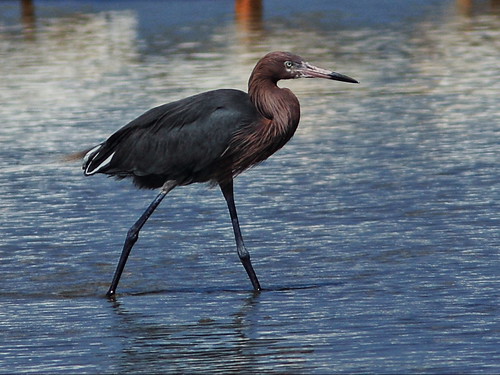
The white morph of the Great Blue Heron is white. Known as the "Great White Heron," it may be confused with the Great Egret. This one visited our back yard lake:
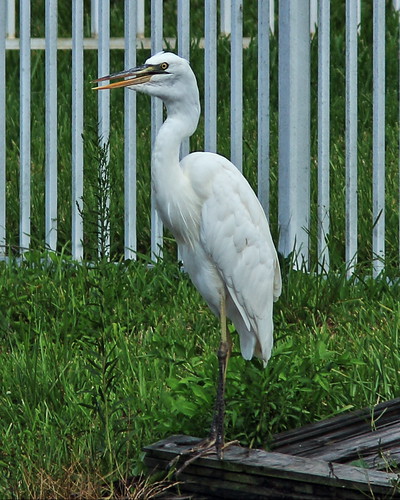
The Great White Heron's bill may be bright yellow like that of the Great Egret, but its legs are lighter in color, not black:
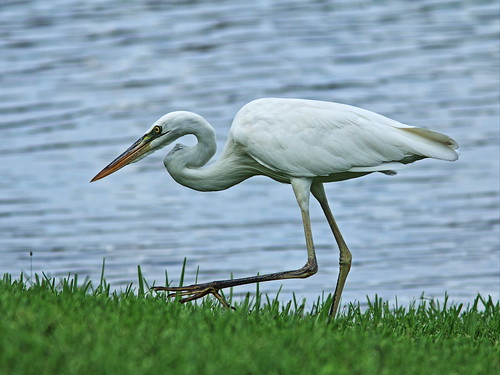
Another white heron which may be misidentified as an egret is the immature Little Blue Heron. Adults of this species are dark. It has greenish legs and a blue-gray bill with a black tip:
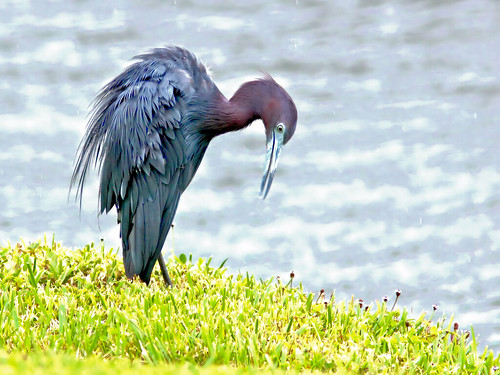
This immature Little Blue Heron is beginning to transform into adult plumage. Its face feathers are a bit dark, and it has scattered blue feathers:
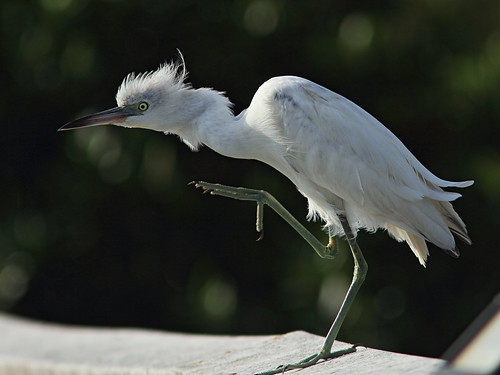
During its second year it becomes progressively darker as it molts:
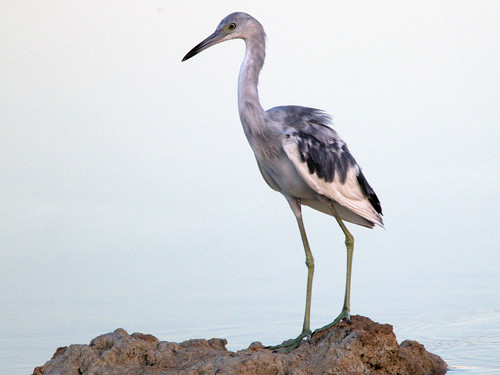
This produces some interesting color patterns:
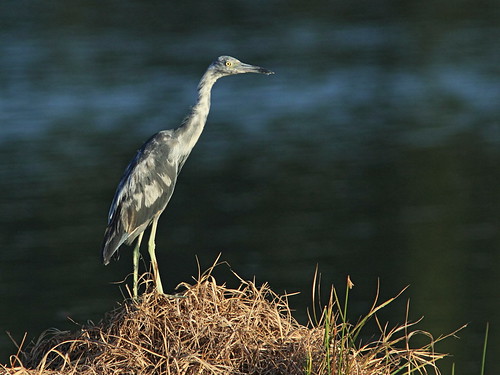
A Boat-tailed Grackle chases a Little Blue Heron which has a contrasting wing pattern:
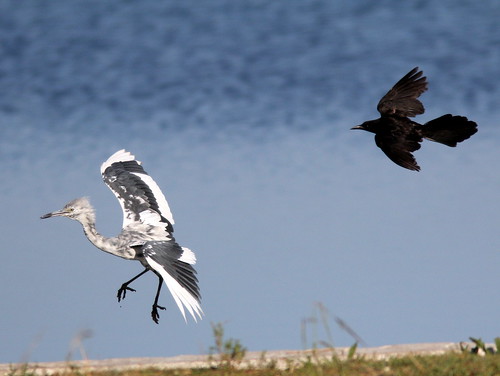
The graceful egrets make such delightful photo subjects:
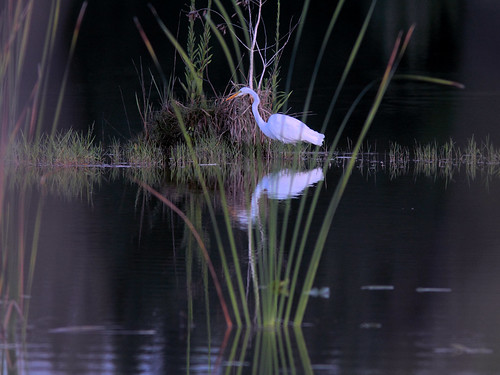
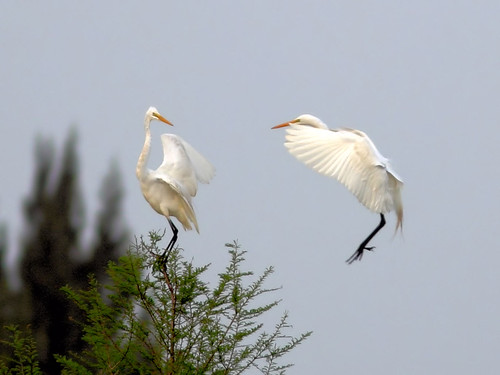
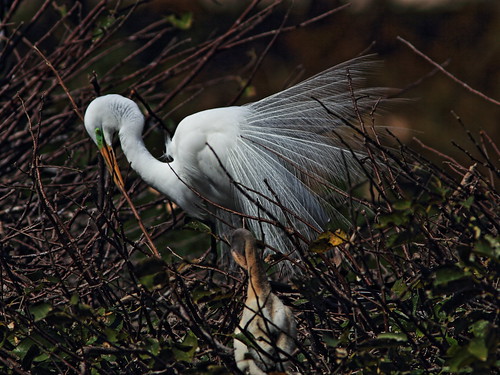
* There are two basic types of feather: vaned feathers which cover the exterior of the body, and down feathers which are underneath the vaned feathers... A typical vaned feather features a main shaft, called the rachis. Fused to the rachis are a series of branches, or barbs; the barbs themselves are also branched and form the barbules. These barbules have minute hooks called barbicels for cross-attachment. Down feathers are fluffy because they lack barbicels, so the barbules float free of each other, allowing the down to trap air and provide excellent thermal insulation. At the base of the feather, the rachis expands to form the hollow tubular calamus (or quill) which inserts into a follicle in the skin. The basal part of the calamus is without vanes. This part is embedded within the skin follicle and has an opening at the base (proximal umbilicus) and a small opening on the side (distal umbilicus). (Wikipedia)
= = = = = = = = = = = = = = =
Linking to Misty's CAMERA CRITTERS,
Linking to Eileen's SATURDAY'S CRITTERS,
Linking to GOOD FENCES by Gosia
Linking to WEEKEND REFLECTIONS by James
Linking to BirdD'Pot by Anni
Linking to Wild Bird Wednesday by Stewart
Linking to Wordless Wednesday (on Tuesday) by NC Sue
Linking to ALL SEASONS by Jesh
________________________________________________
Please visit the links to all these memes to see some excellent photos on display
________________________________________________
Very interesting!
ReplyDeleteTrying to distinguish all the different Herons and Egrets makes me thankful that the only one commonly seen here is the Great Blue Heron. I would never to able to keep all those other ones correctly identified.
Beautiful photos!
Have a great day!
Wonderful fence juxtaposed with the beautiful Great Heron ~ great photography ~ thanks,
ReplyDeleteWishing you a fun weekend ~ ^_^
Gorgeous 'feathered friends' photography ~ and neat fence shot juxtaposed with the Great Heron, thanks,
ReplyDeleteWishing you a fun weekend ~ ^_^ ~ ps ~ this may be a duplicate ~
I may have to enjoy my hikes vicariously through you for a few weeks. I tore my bicep Saturday. Five surgeries, I've never experienced liquid fire like this.
ReplyDeleteKeep shooting (for me)
What a fascinating post, Kenneth, and your photos are phenomenal! I have never seen these beautiful and amazing birds this closely before! Thank you so much for sharing.
ReplyDeleteWow that was interesting ready about the Egrets and Herons, so many varieties. They are all pretty birds. - Gorgeous first two shots, the one with your shadow is very cool.
ReplyDeleteI love water birds with long legs - your pics are gorgeous!
ReplyDeleteOh My! That Egret in flight shot was just stunning! Those details and all the sky shots, Wow!
ReplyDeleteHave a great weekend! Greetings from the Philippines!
Steve
I love your shadow selfie, and the bird lesson. I'm hopeless about birds. I have robins and cardinals down, but that is about it.
ReplyDeleteA delightful post Kenneth. Love the colours in that first shot and your bird captures are superb - thank you for sharing.
ReplyDeleteVery beautiful sequence of images!
ReplyDeleteWow - stunning images!
ReplyDeleteDear sir, you live in a part of paradise and your photos are beautiful.
ReplyDeleteCongratulations!
Love the egret shots... really beautiful. I remember the first time I saw egrets sitting on top of cattle and thinking how odd!!
ReplyDeleteHello, Ken! Great lighting on the first two photos. I love the shadow capture! The egrets and herons are all beautiful, lovely images. Thank you so much for linking up and sharing your post. Happy Saturday, enjoy your weekend!
ReplyDeleteYour egret in flight made me gasp! Wow! I really enjoyed these photos.
ReplyDeleteso talented this photgraphy
ReplyDeleteVery, VERY informative today! Comparing them all within one post is so educational. I enjoyed reading it all. And fantastic photos Ken. When I first really 'got into' birding and IDing them, I associated "Don't Eat Yellow Snow" to keep the snowy egret ID in my head...and it stuck.
ReplyDeleteLove the first images of the opening of your post...neat shadow for early in the morning [my favorite time of day]
For all of us birders at I'd Rather B Birdin', I thank you for sharing this post!!
Stunning first day of spring! Oh those gorgeous egrets!
ReplyDeleteWhoa, these birds are all so elegant, especially the snowy egret -majestic! And thank you for all the info on them to share it with ALL SEASONS! Have a great spring week (although I also love the autumn colors of the first two landscapes)!
ReplyDeleteThere's something about white egrets that fascinates me and your photos really make me smile. I have a pair of gray herons that visit the cattle trough next to my house but they're not as elegant as your white ones. Love all your photos.
ReplyDeleteTrès belle série sur ces oiseaux majestueux ;-)
ReplyDeleteCéline & Philippe
Such great pictures and great information...I've bookmarked this post, especially because of the pics of the immatures which always totally confuse me. Thank you for the beauty and the effort you took to put this all together.
ReplyDeleteSo many wonderful birds! The plumes on the Great Egret are wonderful!
ReplyDeleteSuch good photos and information on IDs for us amateur birders! This post goes in my save forever file! Thank you !
ReplyDelete